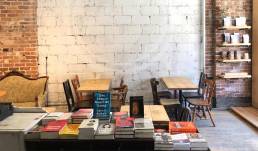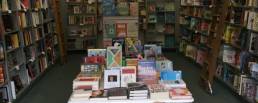Photo Credit: Ontario Culture Days
By: Chris Hampton
With the extra time at home, you may notice you’re tearing through your to-read pile faster than ever before. Or maybe you’ve picked up a book for the first time in years. Whatever the case may be, it is undoubtedly a good time for books. And yet, the pandemic poses some big and scary challenges for local booksellers.
So much of what an indie bookstore does to excel over e-retailers and big box shops is a special, proprietary sort of magic that happens inside its doors. Maybe that’s deft recommendations from knowledgeable staff or some reliably good countertop conversation or a schedule of events that convene the community. What then is a book shop to do when its doors must remain closed into the foreseeable future and an Amazon order is just a few clicks away?
The solution, it turns out, is another type of magic, unique to each store, that includes impromptu online operations, door-to-door deliveries, surprise packs, live-streamed workshops, and, unanimously, some very long hours.
We spoke with five independent booksellers from across Ontario who are finding novel ways to bring the bookstore experience to their customers during lockdown.


Black Squirrel Books and Espresso Bar
Vaughn MacDonald, co-owner of Ottawa bookstore and café Black Squirrel, calls the closure of his business “a winding experience.” Without an online retail setup or any way for customers to browse inventory, the new and used shop’s revenue dried up overnight. They decided to leverage Black Squirrel’s famously broad selection by offering surprise packages. Starting at $25, customers get a carefully curated box of books. Any title they receive and don’t want, can be returned for store credit post-pandemic . A bag of coffee beans can be included for a small additional fee. The response, MacDonald says, has been overwhelming.
When he builds a box, MacDonald tries to include an anthology of short stories (to offer a variety of perspectives), a piece of classic literature, as well as some items he calls “fun and distracting,” like encyclopedias devoted to unusual subjects. French-English picture dictionaries have garnered a good reaction. He gets a lot of requests for classics, like Moby Dick and To Kill A Mockingbird, as well as big, intimidating books, like James Joyce’s Ulysses. “I’m sold out of stuff I’ve never been sold out of before.”
And while the brick-and-mortar shop is closed, Black Squirrel has begun the task of getting its stock online, which first involves a physical inventory count of its 30,000 to 50,000 books. In isolation, they have undertaken a Ulysses-sized project of their own.
Allison the Bookman
“Everyone calls it deceiving,” says Annette Allison-Vander Waal, the third generation of her family to operate the North Bay institution Allison the Bookman, which is celebrating its 47th birthday this month. The little brick storefront on the city’s main drag just goes back and back and back. It’s home to more than 200,000 books. A sign on its exterior declares “1 1/2 miles of books.” And since the closure forced Allison-Vander Waal to temporarily lay off her staff, she’s running that humongous shop all by herself.
For what’s primarily a second-hand bookstore, Allison’s is remarkably well-organized, which helped Allison-Vander Waal’s husband, Scott, hack together and launch an online portal, just in the nick of time, so customers can search the store’s inventory. This means sales haven’t had to stop. Allison-Vander Wall’s hours are spent bouncing between taking requests received by email, phone and Facebook; picking and packing orders; and coordinating curbside pickups. Each night, Scott updates the store’s database from home to reflect the day’s sales. And once a week, Allison-Vander Waal makes deliveries around the city.
Another sign long worn on the shop’s exterior says, “Browsers always needed.” And her browsers are sorely missed, the owner says. “It’s not the same not having people walking around in here, looking, and offering suggestions to help people discover new authors.” She gets the feeling that browsers miss Allison the Bookman, too. More than one customer who’s come for a pickup has told her, “Oh, I miss the smell in there,” the moment she cracks the door open to slide out their purchases.

King W. Books
The west-end Hamilton bookseller and its sister art supply shop, Mixed Media, had planned to launch an online store this summer, but Ontario’s emergency measures made it an immediate necessity. The new site shows customers what King W. has on-hand, as well as what can currently be ordered from suppliers. It’s been crucial for business, says owner Dave Kuruc, but it’s only part of the fuller bookstore experience he wishes to offer. “I always say we need one kind of transaction to keep the lights on — and that’s people buying things — the other kind of transaction we need is the stories — it’s the people coming in, it’s the interaction you can’t put a dollar value on. For me, as a shopkeeper, that’s what makes it worthwhile.”
In hopes of salvaging some of those lost conversations had around the checkout counter, Kuruc has recently begun conducting daily deliveries on his bicycle. The friendly bookseller will drop off your order and gamely chat for five or 10 minutes about an advanced reader he’s enjoying or an album you’re hooked on from across the sidewalk or the bottom of your porch stairs. He calls these face-to-face interactions “the spark” that “brings a little magic to the day.” It’s something a good bookstore uniquely provides that he hopes dearly to rekindle.
Biblioasis
Business is actually up 11 per cent at Biblioasis, Windsor’s beloved bookstore-publisher combo, since it shut its storefront and got a brand new web shop off the ground in just 48 hours. Founder Dan Wells calls their local delivery service a particular success, reaching customers they hadn’t previously. It’s a service that will continue on the other side of the pandemic, he says.
But the store’s wins extend beyond enviable sales stats and into the more programmatic end of what a good bookstore does, too. Staff picks have morphed into daily book recommendations published via Facebook. Biblioasis’s Stay-Home Book Club meets weekly on Zoom and gathers a couple dozen participants each session. For April, which was National Poetry Month, the club read the anthology Best Canadian Poetry 2019 (published by Biblioasis ), and for May, they’re tackling Best Canadian Stories 2019. Now, the store has begun organizing virtual author talks to be broadcast on Facebook Live. The first, which happened May 5, put the RBC Taylor Prize-winning author of Bush Runner, Mark Bourrie, in conversation with Margaret Atwood.
Glad Day Bookshop
Glad Day Bookshop, located in Toronto’s Church Wellesley Village, has the distinction of being the world’s oldest LGBTQ bookstore. More than your standard book dealer, Glad Day is a buzzing community space, café and bar that hosts over 70 live events monthly, including poetry readings, author talks, dance parties, drag shows, and workshops.
When the space closed its doors in mid-March, it quickly became clear to owners that food deliveries and online book sales weren’t going to cover rent and wages, never mind providing support for the store’s broader community, so they launched a fundraiser. The Emergency Survival Fund provides swift grants for LGBTQ artists, performers and tip-based workers. It also goes toward ensuring Glad Day stays open and operational. “We’ve been able to provide emergency support to 500 people,” says co-owner Michael Erickson. They’ve raised an incredible $210,000 so far.
Another portion of the fund goes toward paid work for artists through the shop’s newly-launched Glad Day TV. The web channel brings Glad Day’s usual daily live programming online via Zoom with about 20 events a week. A typical day might include a crafting hour, a dance workshop, a comedy slot and a drag performance. “GDTV provides a way for folks to tune in, to see each other … and to feel connected,” Erickson says. “That’s pretty important, too, because it’s what Glad Day functions as — it’s a safe space.”
Chris Hampton is an arts and culture writer based in Hamilton. His work has appeared in Canadian Art, The Walrus, The Globe and Mail, Toronto Star, CBC Arts and The New York Times.
